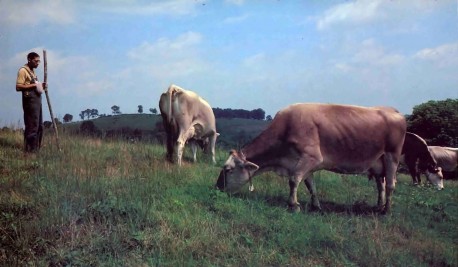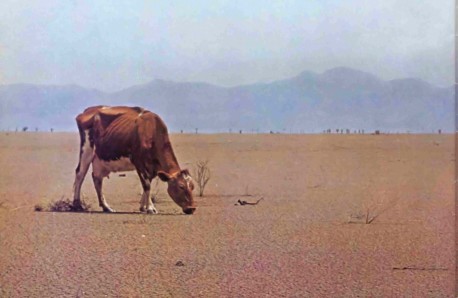Why—and What to Do?
by Balavanta dasa
During last winter’s big freeze, all our slick technology couldn’t heat the nation’s factories or keep traffic moving. Now, in the middle of one of the worst droughts ever, our scientists are resorting to “cloud seeding”—but they can’t find any worthwhile clouds to seed…. Could it be that amid all their attempts to control nature, the scientists are forgetting the Supreme Controller?
At present the entire world is experiencing severe irregularities in the natural weather pattern. For example, whereas fifty years ago India had two monsoon seasons every year, now she has only one, and her food production has significantly decreased. In fact, just ten years ago a drought in India brought starvation to millions, and to this day parts of South India have yet to receive sufficient rain for even subsistence agriculture. In Africa the Sahara Desert is rapidly spreading southward, which is creating an acute food problem for many. Russia’s Ukraine once was known as Europe’s breadbasket, but for the last three years insufficient rain has forced the U.S.S.R. to import millions of tons of grain from the United States. Earthquakes have devastated large cities in China, Eastern Europe, and the Middle East. And in Western Europe, especially in England, last summer’s drought drastically reduced food production.
Although still the most economically prosperous nation in the world, the United States is also experiencing its share of problems. In the South this year, portions of both Georgia and Florida have been declared disaster areas because of severe drought. The West is now sizzling from the worst drought on record—one in which even the usual solution of irrigation is proving futile. And last year in the North, one of the worst winters in history killed hundreds of men and animals, tortured thousands more, and cost millions of dollars in damage. Without a doubt, irregular and uncontrollable weather has become a critical problem all over the world. Without sufficient rain, moderate temperatures, and a stable earth, how can we survive—what to speak of living happily and peacefully?
Of course, anyone can point out the problems, but real intelligence means finding a workable solution. Should we, then, look to our so-called brain trust of advanced science and technology? Certainly not. The scientists are scurrying to produce theories and answers, but by their own admission they are becoming hopeless. They are being forced to admit that whatever progress they have made toward “weather control” is at best experimental and theoretical. Last winter, with much of the United States in the grip of sub-freezing weather and with snow piled up everywhere, our scientists’ slick technology was powerless to heat the nation’s factories and keep traffic moving. Now the scientists are trying to seed the clouds—but they can’t find any worthwhile clouds to seed! Time and again modern science has proved helpless in the face of nature’s fury. So instead of presenting yet another pseudoscientific pipe dream, I offer here a practical solution to our modern weather dilemma—the time-tested program of the ancient Vedic civilization.
Literatures such as the Bhagavad-gita (the Song of God) and the Srimad-Bhagavatam (the Beautiful Story of the Personality of Godhead) form the basis of the Vedic culture—the culture that prevailed throughout the world millions of years ago. These great literatures declare that the purpose of human life is not simply to enjoy sense gratification. Nor are we meant to exploit nature, vainly trying to conquer her through technological advancement. Rather, following the process outlined in the Vedic literatures, we should live simply and use our advanced human intelligence to revive our original God consciousness. Becoming God conscious means living in harmony with God’s plan for universal management. When we live in this way, then we are automatically in harmony with nature, and the Lord bestows bounteous natural gifts upon us. Otherwise—if we avoid surrendering to God and foolishly try to conquer nature—then as we see today, nature’s stringent laws will put us into difficulty, just as the state puts a criminal into difficulty.

The Srimad-Bhagavatam tells how in Vedic times the people’s high level of God consciousness resulted in benevolent weather conditions everywhere. There was plenty of rainfall—but only during the night, while the people were asleep—and the climate was neither too hot nor too cold. Consequently, all the fruit trees, vegetables, grains, and grasses grew profusely. The lush pastures enabled large herds of cows to eat their fill—any time they liked. Cow slaughter was unknown in those days, so the cows were always very happy. In fact, because of their jolly dispositions, they produced so much milk that it would often leak out of their milk bags and muddy the pastures. (Modern “beef cows” are so miserable that they can’t produce enough milk to feed even their own calves!) Because there was plenty of milk, butter, cream, yogurt, fruit, grain, vegetables, herbs, minerals, jewels, and so on, the people were peaceful and happy in all respects. Even if someone were to leave a valuable object in a public place, he could always find it when he returned, because everyone was so satisfied by nature’s opulences that they had no inclination to steal.
“What happened to the Vedic culture?” you may ask. “If it actually existed, and if it really had such a workable solution to the world’s problems, then why did it disappear?” Even a young, healthy person gradually becomes old and diseased. And in the same way, although the Vedic civilization was perfectly constituted (according to the Bhagavad-gita, God Himself provided the guidelines), gradually it degraded. In fact, Srila Vyasadeva, the author of the Srimad-Bhagavatam, foresaw our present troubles over five thousand years ago. He wrote that the present age (the Age of Kali) would be characterized by increasing Godlessness, which would cause severe conflicts and hypocrisy. Srila Vyasadeva also foresaw that because of the lack of God consciousness, natural disturbances (especially drought) would harass the people more and more.
Then are we doomed to worsening weather conditions? No. Vyasadeva also pointed out that although the present age would be full of faults, it would have one very good quality. In this age we can very easily satisfy the Lord—and everyone can thus live very happily and peacefully—simply by coming together and chanting the Lord’s holy names: Hare Krishna, Hare Krishna, Krishna Krishna, Hare Hare/ Hare Rama, Hare Rama, Rama Rama, Hare Hare. If people perform this sacrifice, which is called sankirtana, they will counteract all the Godlessness and ill effects of the Kali Age.

Does this seem too simple a solution to the myriad problems we face? Actually, it is a very logical and scientific one. Consider: weather conditions are part of nature, but nature cannot exist or function independently. As soon as we speak of nature, we must ask, “Whose nature is it?” As soon as we say “mother nature,” we must ask, “Who is the father?” The father—and the controller of nature—is God, the Supreme Personality, Sri Krishna. This fact is confirmed in the Bhagavad-gita, where Krishna says, mayadhyaksena prakrti: “Nature works under My direction.” Nature cannot produce the millions and millions of living organisms without the help of the supreme father (God) any more than a mother can produce children without the help of her husband. If mother nature exists, and if the “children” (the living entities) exist, then on what grounds can we deny the existence of the father. God?
The orderly management we see in nature is proof of God’s existence. Without the controlling intelligence of God, how could things be going on as they are? When a child sees a light bulb, he may think that it is producing light automatically. But we know that behind the light bulb is the arrangement of the electric company, the power generators, and ultimately the government. Similarly, behind the sun, behind the rain, behind all the forces of nature is the Supreme Lord. Less intelligent people argue that since they cannot see God, He must not exist. But we can’t always see the power station or the president, either. Does that mean they don’t exist? Wherever we see complex organization, we know that there is intelligent management going on behind the scenes. For example, if a large city is to have order, it must also have elaborate management—otherwise, there will be chaos. Also, everyone has experienced that if a building or farm has no management, it quickly deteriorates to weeds and cobwebs. And, in every case, management means that there is a manager. How, then, can we imagine that the universe—with its regularly changing seasons, its orbiting planets, its extraordinarily intricate biological and ecological systems—is working automatically, without a supreme manager? This is simply a childish idea.
So God exists, and He controls nature in every galactic and atomic detail. Actually, God has two “natures”—the material and the spiritual. In the Bhagavad-gita the Sanskrit term for nature is prakrti, “that which is controlled.” Now, material nature is made of inert, dead matter and is called apara prakrti, or inferior energy, and spiritual nature is composed of the conscious living entities and is called para prakrti, or superior energy. Both the material and spiritual energies are controlled by God. But the living entities are designated as superior energy because they are conscious and because they try to exploit material nature. Material nature, being unconscious, cannot move itself, any more than a car can move itself. We may not see the car’s driver, but we know that he must always be there. In the same way, we may not see God, but we should know for certain that He is “driving” or controlling the whole universe.
The Vedic literatures tell us, therefore, to stop foolishly denying God and start learning to work cooperatively with Him. As we have seen, prosperity depends not on our work but on the background arrangement of the Supreme Lord. He supplies all our necessities—food, water, heat, light, air, soil—none of which we can manufacture. Even manufacturing enterprises require raw materials like iron, sulfur, manganese, mercury, and so on. Obviously, we cannot live except by the grace of the Lord. And how do we achieve His grace? By performing sacrifices to please Him. But one who will not do that will soon find himself in scarcity, as we are seeing so plainly today.
Performing sacrifice simply means that we reciprocate the Lord’s kindness. This is only natural. A father gives everything to his son, and when the son offers him a gift in return, the father gladly accepts it and they both enjoy the loving exchange—though the father actually doesn’t need anything from the son. In the same way, we should offer something to the Lord in sacrifice—to express our appreciation for His gifts and to reciprocate His love. God doesn’t actually need anything from us, but if we aren’t grateful enough to try to please Him in some way—and, indeed, if we are so foolish as to deny His very existence—why should He continue to supply us with rain and other necessities?

So, once again: if we want to live happily and prosperously, we have to perform sacrifice to the Supreme Lord. If we satisfy Him, He will bestow all wonderful and bounteous things upon us; but if we ignore Him, what can our puny material science and technology do? This world exists just so that we can have a chance to learn the spiritual science of devotional service, the science of satisfying Krishna (God). This is the eternal occupation of the self, or soul, but now we have forgotten it. So out of kindness Krishna provides us with all the necessities of life simply so that we can use them to revive our consciousness of Him. But if we keep ignoring the purpose of life and simply take everything from the Lord for our own sense gratification, we’re thieves—and we have to suffer punishment under the laws of material nature.
Such is the state of the world now. We have become a civilization of gross materialistic thieves, and we have forgotten everything about sacrifice to the Lord. But the situation isn’t hopeless. As previously mentioned, just for our degraded society the Lord has given the very easy process of sacrifice called sankirtana, the congregational chanting of the Hare Krishna mantra: Hare Krishna, Hare Krishna, Krishna Krishna, Hare Hare/ Hare Rama, Hare Rama, Rama Rama, Hare Hare. In fact, all the Vedic literatures recommend this sacrifice for the present age. (Of course, chanting any genuine name of God will help, but the Vedic literatures say that in the Kali Age the Hare Krishna mantra is the most effective.)
Clearly, we should give up our elaborate arrangements for conquering nature and enjoying sense gratification. Instead, we should live simply and meet together as often as possible to chant the holy names of God. If we offer the Lord this sacrifice, surely He will be pleased with us and provide all the natural resources we need to live comfortably and become God-conscious.
On the national level, government leaders should arrange for large-scale performances of sankirtana. They should discontinue their stop-gap efforts to alter or control the weather, which are all destined to fail because they ignore God. The Srimad-Bhagavatam affirms that government leaders are responsible for everything that happens within their jurisdiction—including weather conditions. So all of us should immediately demand that our leaders arrange to satisfy the Lord through sankirtana—which will bring an end to all the natural disturbances that now plague us.
The purpose of the Krishna consciousness movement is to spread sankirtana as widely as possible. At present people all over the world are suffering, but if they will just take the Krishna consciousness movement seriously, give up their sinful activities, and chant the Hare Krishna mantra, they will solve all their problems without difficulty and become supremely peaceful and happy.


Leave a Reply